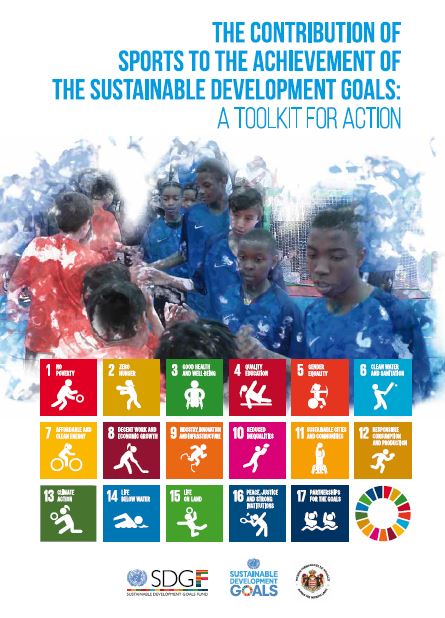July 10, 2018
UN presents a new toolkit for action on how sports can contribute to achieve SDGs
With the World Cup at the center of conversations around the world, the UN hosted a different type of discussion on sports: how by bringing together governments, athletes, civil society, sport companies and private sector, sport can contribute to the achievement of the sustainable development goals.
The 2030 Agenda for Sustainable Development acknowledges sport as an important enabler of sustainable development, recognizing the growing contribution of sport to the realization of development and peace in its promotion of tolerance and respect and the contributions that it makes to the Sustainable Development Goals.
This was emphasized in paragraph 37 of the Political Declaration contained in resolution 70/1 entitled “Transforming our world: the 2030 Agenda for Sustainable Development”, where the UN Member States at the highest level recognized that “sport is also an important enabler of sustainable development” and valued “the growing contribution of sport to the realization of development and peace in its promotion of tolerance and respect and the contributions it makes to the empowerment of women and of young people, individuals and communities as well as to health, education and social inclusion objectives.”
In line with this, the Principality of Monaco and the Sustainable Development Goals Fund (SDG Fund) jointly recognize the key role sport plays in sustainable development. The SDG Fund is the first UN joint development cooperation mechanism that implements the SDGs. It does so through partnerships with UN agencies and their public and private sector partners to address the challenges of poverty and sustainable development.
Of specific interest to the SDG Fund is the contribution of sports in ensuring peace and the promotion of respect for people regardless of socio-economic backgrounds, races, sex or age. This has led to the development of a toolkit on mainstreaming SDGs in sports which was launched at the UN headquarters in New York in the opening day of the High Level Political Forum 2018, the annual gathering of governments, UN, civil society, private sector and experts who during the next two weeks will review advances and challenges in the implementation of SDGs.
The toolkit, with a special focus on pilot initiatives already implemented by major sports actors, reflects the experiences of the SDG Fund and those of the various UN entities, development organizations and sports companies, which have used sport and recognized its value as a far-reaching tool for development and peace. In doing this, it aims to raise visibility and understanding of the SDGs while also showcasing and promoting the contribution of sports and best sports practices in relation to the SDGs by relevant stakeholders including United Nations entities, Member States, sports-related organizations, non-governmental organizations, sports associations, foundations, civil society, academia and the private sector.
The toolkit also builds on the lessons learned and results of the “SDGs Youth World Cup 2018”, a pilot project organized by the Principality of Monaco in New York from 22 to 24 June.
After highlighting the United Nations resolutions on sports and development and how these resolutions have become integral in shaping major sports events such as the Olympics, the World Cup and other major sports tournaments across the world, the toolkit offers a series of recommendations to leverage the potential of sports to achieve the SDGs. Some of them include:
- Sports is a cost-effective and powerful tool for promoting important human values such as respect for rules and for others, teamwork, discipline, diversity, hospitality and empathy. By leveraging its social cohesion capabilities, sports can be used to instill these values into young people and curb youth restiveness. This is so because people often set aside religious, tribal or ethnic differences for the love of the game.
- In addition to numerous social benefits, sports instill healthy lifestyle choices among children and youth by helping them remain active and combat non-communicable diseases.
- The role of sports in promoting gender equality is also critical. Sports helps girls and women build self-esteem and develop skills needed to become equal participants and leaders in their various communities.
- In the true spirit of leaving no one behind, the power of sports in social inclusion is also brought to play in its ability to create awareness about social inclusion for persons with disabilities.
- Sports has a strong convening power with the ability to raise visibility, understanding and achievement of the SDGs worldwide. The toolkit discusses how sports can be integrated into key SDGs and their targets.
- More public private partnerships are needed in the sports world to drive the achievement of the SDGs by leveraging on the various expertise of the various stakeholders. This includes governments, private sector orgainzations and local communities.
- There is also a need for governments to create policies that promote these partnerships that can fast track the achievement of the SDGs through sports.
- Sports has the potential to create jobs. Today, possibly more than any other time in human history, sports is seen an avenue to sustainable incomes and livelihood and is undoubtedly the reason why most people venture into it thereby lifting millions of people out of poverty.
These are just a few of the recommendations in the toolkit and it is our belief that if adopted, they will further drive the achievement of the SDGs by leveraging on the convening power of sports.







